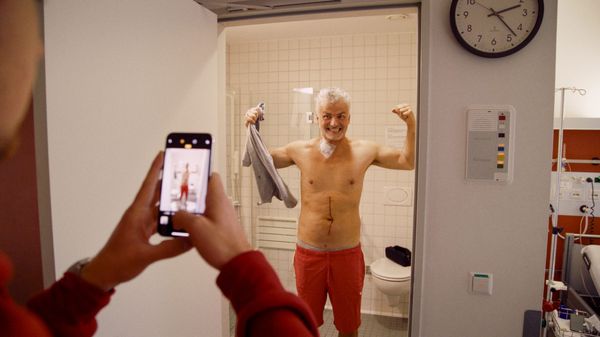Eye For Film >> Movies >> I Won't Die (2023) Film Review
I Won't Die
Reviewed by: Sergiu Inizian

Disease and hope stand as the main pillars of Asia Dér’s sophomore documentary exploring the story of Gábor, an affluent art gallery owner battling cancer. He is constantly shifting between giving in to his sickness and staying the courageous man everyone around sees him as. The Hungarian filmmaker quietly observes his subject choosing a naturalistic visual style that allows the man to project strength, suffering and inspiration on his own terms.
Through sheer minimalism, Gábor becomes the sole driver of the narrative, the viewers following him around at his galleries, hospital and home. He stands out, but this is not due to his illness. He is charismatic and deeply cares about his work. Some scenes cast him as some sort of superstar. Or a playboy, as one of his sons calls him.

Beneath his perceived fortitude, there is a sense of uneasiness, felt by his reluctant children, Bruno and Zsombi. In his discussions with them, his opinions always seem to have the upper hand, allowing fragments of their concern to surface quietly on the screen. They feel the weight of the situation but Gábor identifies a need to shelve it for a while. The camera beautifully captures the fear of the two sons, who are overwhelmed by the diagnosis and somewhat bewildered by their father’s cheer.
Whenever he is not working, treating his disease or spending time with friends and family, we experience Gábor's brief moments of despair. They’re visibly burdensome. The ominous score, by Gábor Keresztes, accompanies the protagonist in these scenes, the beat seemingly mirroring his heartbeat, almost guiding him towards the unknown.
Dér briefly breaks the illusion of total observation to gently check on her subject in these quiet moments. This compassionate sensibility is an essential piece of her genuine concern with exploring human connection in times of struggle, an aspect also represented by the presence of his friend. Sándor visits him at the hospital, spends time with Gábor at his old school and invites him over for dinner. Their discussions are nuanced, adding details about his childhood, his perceived strength, and also challenging his position as a privileged cancer patient. These particularities are meaningful as they form the protagonist’s identity, which at some points, tends to cast a shadow over his illness.
Gábor’s grappling with disease does not need stylisation. The austere hospital room, his steely eyes and his reactions to the treatment tell a compelling story of uncertainty. In contrast, his gallery and general curatorial work function as the only decoration that his story needs. These abstract splashes of colour surround him and reflect his flamboyant personality, which is the main driver of his positive attitude.
For the director and protagonist, the title is not an arbitrary set of words. It is a mantra, that resonates with those affected by his terrible disease. Dér takes this assertive promise and translates it into her filmmaking, observing an active protagonist who gets tossed around by his sickness but decides to face the unknown regardless of what it might reveal.
Reviewed on: 15 Oct 2023














